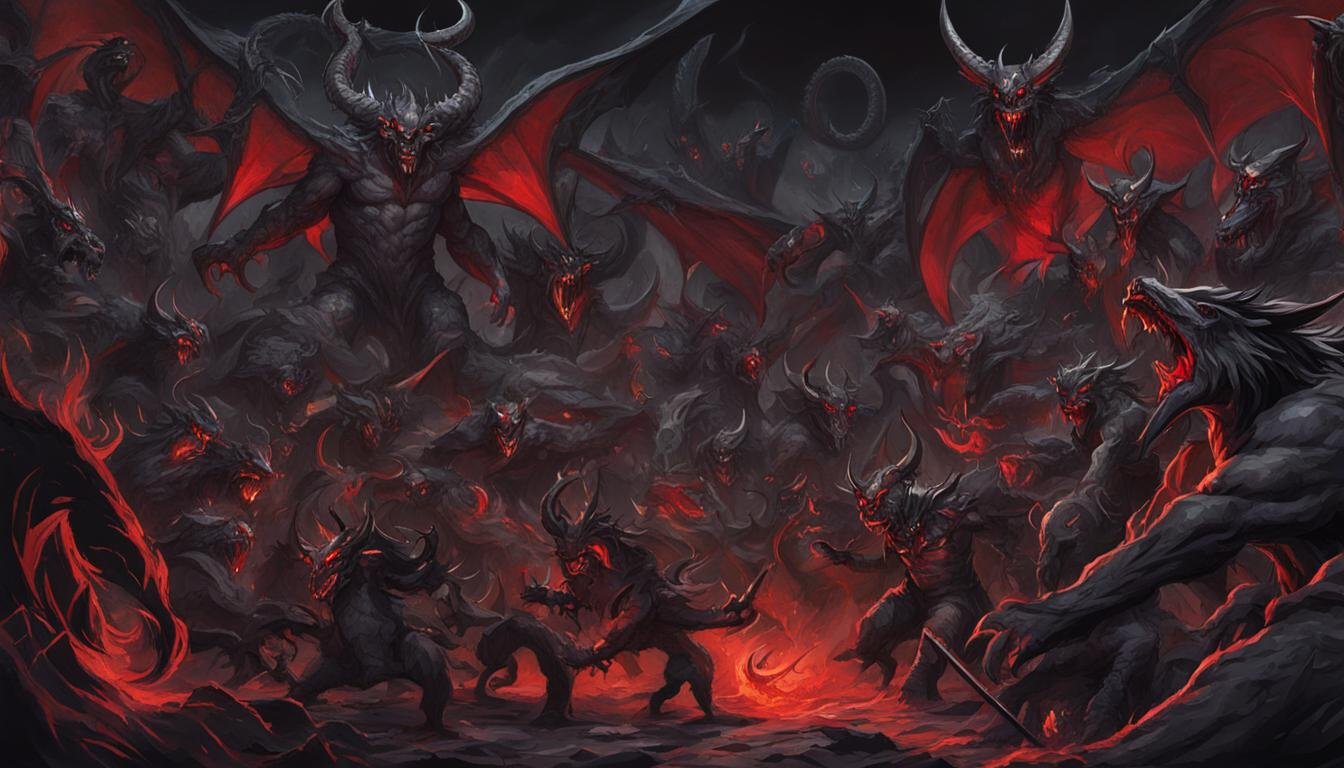In biblical scripture, there are multiple references to demons, representing entities with ill intentions and spiritual influences. Understanding the number of demons mentioned in the Bible can provide insight into their existence and the potential impact on human lives.
According to Dr. Jerry Robison’s book, “Strongman’s His Name… What’s His Game?”, there are 16 biblically named demonic spirits. These demons include the Spirit of Divination, Familiar Spirit, Spirit of Jealousy, Lying Spirit, Perverse Spirit, Spirit of Haughtiness, Spirit of Heaviness, Spirit of Whoredoms, Spirit of Infirmity, Deaf and Dumb Spirit, Spirit of Bondage, Spirit of Fear, Seducing Spirits, Spirit of Anti-Christ, and Spirit of Error.
These demons each have their distinctive manifestations and activities, with specific bindings and loosenings according to scripture. It is essential to acknowledge that this list represents biblically named demons and may not encompass all demonic entities mentioned in scripture.
Key Takeaways:
- – The Bible references multiple demons with distinct names and characteristics.
- – Understanding the number of demons mentioned in scripture provides insight into their existence.
- – Dr. Jerry Robison’s book outlines 16 biblically named demonic spirits.
- – Each demon has its unique manifestations, activities, and specific bindings according to scripture.
- – The list of biblically named demons may not encompass all demonic entities mentioned in the Bible.
Angels in the Bible: Messengers of God
Angels play a significant role in the Bible, serving as messengers of God and carrying out His divine purposes. Described as supernatural beings with extraordinary powers, they are often depicted as distinct individuals with their own personalities. While the Bible does not specifically mention female angels, it also does not assign a specific gender to these celestial beings.
These heavenly beings are referred to as ministering spirits and are responsible for various duties. One of their primary roles is protection, as they are tasked with guarding and guiding individuals. In times of danger or distress, angels are dispatched to provide assistance and deliverance. These guardian angels act as a comforting presence, offering solace and reassurance to those in need.
Furthermore, angels serve as intermediaries between God and humanity. They are tasked with delivering divine messages to individuals, acting as conduits for God’s communication. These messages can range from words of comfort and guidance to warnings and instructions. Throughout the Bible, numerous accounts highlight the involvement of angels in relaying important messages to prophets, leaders, and ordinary individuals.

Angels are not limited to spiritual form alone. In numerous instances, they appear in human form, interacting with humans and carrying out their duties discreetly. This ability to take on human appearance allows them to blend seamlessly into the earthly realm while fulfilling their heavenly assignments.
Characteristics of Angels:
- Extraordinary powers and abilities
- Distinct personalities
- Ministering spirits
- Protectors and guardians
- Divine messengers
- Capable of appearing in human form
Overall, angels in the Bible embody the essence of divine servitude. They faithfully execute God’s will, offering protection, guidance, and divine communication to humanity. As believers, it is comforting to know that these heavenly beings are at work, unseen but ever-present, fulfilling their angelic duties in accordance with God’s plan.
The Nature of Demons: Fallen Angels with Ill Intentions

In Christianity, demons are understood as fallen angels who chose to rebel against God and align themselves with Satan. They were originally created as good beings but turned evil after their disobedience. Demons possess distinct characteristics and play different roles within their spiritual hierarchy. Understanding the nature of demons helps believers recognize their strategies and protect themselves from their influence.
Demonic Influence on Humans
Demons have the ability to demonize or possess humans, exerting control over their thoughts, actions, and words. They exploit vulnerabilities and weaknesses, luring individuals into sin and leading them away from their faith. Through manipulation and deception, demons can provoke visions, influence desires, and create confusion.
“The devil is a deceiver. He manipulates people into believing his lies and distracts them from the truth,” says Pastor James Anderson.
It is crucial to note that while demons can influence individuals, they do not possess absolute power. Through spiritual intervention and reliance on God, believers can expel these malevolent entities and regain control of their lives.
Demonization and Spiritual Warfare
Demonization, the process by which demons exert control over humans, is a real phenomenon described in biblical texts. Christians are encouraged to engage in spiritual warfare, a battle against demonic forces, by putting on the armor of God and using spiritual weapons such as prayer, fasting, and the Word of God.
“Spiritual warfare is an ongoing fight against the forces of darkness. It requires spiritual discernment, faith, and perseverance,” says theologian Dr. Sarah Thompson.
Staying grounded in faith, developing a strong relationship with God, and seeking guidance from spiritual leaders are essential for countering demonic influence. Believers are encouraged to practice discernment, regularly cleanse their minds and hearts, and surround themselves with fellow believers who can provide support and accountability.
| Characteristics of Demons | Significance |
|---|---|
| Manipulative | Demons use manipulation tactics to deceive and lead astray. |
| Tempting | They tempt individuals to sin and abandon their faith. |
| Confusing | Demons create confusion and doubt through their influence. |
| Influential | They exert influence over thoughts, actions, and desires. |
Conclusion
The exploration of demons in Christianity reveals their existence as fallen angels with ill intentions. While demons possess the ability to influence and manipulate humans, it is crucial to understand that they are not all-powerful. Believers are called to engage in spiritual warfare and stay grounded in faith to resist their influence.
Staying sober and alert, Christians must be aware of the enemy’s tactics and seek refuge in God’s strength. By maintaining a strong relationship with Him, studying His Word, and practicing spiritual disciplines, believers can withstand the temptations and deceptions of demons.
Spiritual warfare is an ongoing battle that requires constant vigilance and reliance on God’s power. It is through prayer, worship, and the guidance of the Holy Spirit that believers can combat the spiritual forces of darkness. By staying rooted in faith and trust in God, Christians can navigate the challenges posed by demons and remain steadfast in their walk with Him.
FAQ
How many demons are mentioned in the Bible?
According to Dr. Jerry Robison’s book, “Strongman’s His Name… What’s His Game?”, there are 16 biblically named demonic spirits. These include the Spirit of Divination, Familiar Spirit, Spirit of Jealousy, Lying Spirit, Perverse Spirit, Spirit of Haughtiness, Spirit of Heaviness, Spirit of Whoredoms, Spirit of Infirmity, Deaf and Dumb Spirit, Spirit of Bondage, Spirit of Fear, Seducing Spirits, Spirit of Anti-Christ, and Spirit of Error. It is important to note that this list represents biblically named demons and may not encompass all demonic entities mentioned in scripture.
What are angels in the Bible?
Angels in the Bible are described as messengers of God and are portrayed as supernatural beings with extraordinary powers. They are sent to execute God’s purposes on earth and are referred to as ministering spirits. Angels have various responsibilities, including protection, rescue, and bringing messages from God to humans. They are depicted as distinct individuals with their own personalities and are capable of appearing in human form. While the Bible does not mention female angels, it does not ascribe a specific gender to angels. They reside in Heaven with God and are created beings meant to serve Him.
What is the nature of demons?
Demons are fallen angels who rebelled against God and chose to follow Satan. They were originally created as good beings but became evil after their rebellion. Demons have levels and different purposes in their spiritual hierarchy. They can possess (demonize) humans, influencing their thoughts, actions, and words. Demons have the ability to confuse and deceive people, often tempting them to sin and abandon their faith. They can also manipulate humans by provoking visions and influencing their desires. Demons are not all-powerful like God and can be expelled through spiritual intervention, but caution must be taken to ensure proper spiritual care to avoid worsening the situation. Examples of demons mentioned in the Bible include Satan, Molech, and Legion.
How can believers counter demonic influence?
The Bible provides insights into the existence and nature of demons, as well as strategies for countering their influence. Believers are warned to stay sober and be alert, as the enemy seeks to devour and tempt them away from God. It is important to understand that demons are not all-powerful and cannot directly control humans, but they can manipulate and influence them through various means. Christians are encouraged to rely on God’s strength and stay grounded in faith to resist demonic influence. By maintaining a strong relationship with God, studying His Word, and practicing spiritual disciplines, believers can withstand the tactics of the enemy and remain steadfast in their faith.

I’m Benjamin, a passionate spiritual seeker and creator of Verses and Prayers. Alongside my girlfriend Emma and our pet lizard Mulle, I cherish family life, enjoy exploring new places, and am deeply involved in my church community. My love for reading and singing biblical verses inspires every aspect of my journey.

